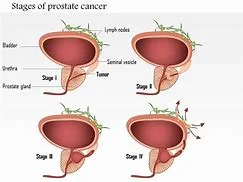Prostate Cancer: A Comprehensive Guide to All Your FAQs from an Uro-Oncologist

Prostate cancer is a prevalent form of cancer that affects men. It occurs in the prostate gland, a small walnut-sized organ found in the male reproductive system. The prostate gland is responsible for producing semen, the fluid that nourishes and transports sperm.
At Ananta Urology and Robotics Clinic , we specialize in the diagnosis, treatment of prostate cancer in Ahmedabad , India. Our team of highly skilled UroOncologist and robotic surgeon led by Dr Rohan Patel is dedicated to providing advanced and comprehensive care to our patients.
Stages of Prostate Cancer
There are different stages of prostate cancer, which require tailored treatment approaches. These include :

1. Localized Prostate Cancer - This is the earliest stage of prostate cancer, where the cancer cells are found only in the prostate gland. Treatment options for localized prostate cancer may include active surveillance, surgery, radiation therapy, or focal therapies like cryotherapy or high-intensity focused ultrasound (HIFU).
2.Locally Advanced Prostate Cancer - In this stage, cancer has spread beyond the confines of the prostate but has not reached distant organs or lymph nodes. Treatment options may involve a combination of surgery, radiation therapy, hormone therapy, or chemotherapy, depending on the extent and aggressiveness of the cancer.
3.Metastatic Prostate Cancer - This stage occurs when cancer cells have spread to distant organs, such as the bones, liver, or lungs. Treatment for metastatic prostate cancer may include hormone therapy, chemotherapy, targeted therapy, immunotherapy, or radiopharmaceutical therapy.
4.Castration-Resistant Prostate Cancer - Castration-resistant prostate cancer is a term used to describe prostate cancer that continues to grow and spread even after hormone therapy. Treatment for castration-resistant prostate cancer may involve chemotherapy, immunotherapy, targeted therapy, radiopharmaceutical therapy, or participation in clinical trials.
5.Recurrent Prostate Cancer - Recurrent prostate cancer refers to cancer that has returned after initial treatment. Treatment options for recurrent prostate cancer depend on several factors, such as the location and extent of the recurrence, previous treatments, and overall health status.
Robotic Surgery for Prostate Cancer
Robotic surgery, also known as robot-assisted laparoscopic surgery, is a minimally invasive surgical technique that allows surgeons to perform complex procedures with precision and control. At Ananta Urology and Robotics Clinic , we are leaders in the field of robotic surgery for prostate cancer .
Robotic surgery offers numerous advantages over traditional open surgery, including :
1. Precision - The robotic system provides enhanced visualization with high-definition 3D imaging and magnification, allowing for precise removal of cancerous tissue while preserving surrounding healthy tissue.
2.Minimal Invasiveness - Robotic surgery requires smaller incisions, resulting in less pain, reduced blood loss, and a faster recovery time compared to open surgery.
3.Reduced Complications - The robotic system's advanced technology reduces the risk of complications such as infection, nerve damage, and incontinence.
4.Quicker Return to Daily Activities - With robotic surgery, patients experience a shorter hospital stay and can quickly resume their normal activities.
During a robotic prostate cancer surgery, the surgeon controls robotic arms equipped with surgical instruments through a console. The instruments mimic the surgeon's movements, translating them into precise robotic movements inside the patient's body.
The benefits of robotic surgery extend beyond the operating room. Our patients often experience improved cancer control rates and better quality of life outcomes, such as improved urinary and sexual function, compared to traditional surgery.
To see how robotic surgery works for prostate cancer, check out this informative video : Robotic Prostate Cancer Surgery.
FAQs about Prostate Cancer :
How is localized prostate cancer treated?
The treatment options for localized prostate cancer depend on various factors, including age, overall health, and tumor characteristics. Options may include :
active surveillance,
surgery (such as robotic-assisted radical prostatectomy),
radiation therapy,
or focal therapies.
What is the recovery process like after robotic prostate surgery?
The recovery process after robotic prostate surgery is usually faster compared to traditional open surgery. Patients may experience discomfort or pain for a few days, but it can be managed with pain medication. It is important to follow post-operative instructions provided by the surgical team.
Can prostate cancer come back after treatment?
Yes, like many cancers, prostate cancer can come back after treatment. This is known as recurrent prostate cancer. The risk of recurrence depends on the stage, grade, and treatment of the initial cancer. Regular follow-up and monitoring are essential for early detection of recurrence.
At Ananta Urology and Robotics Clinic, we are committed to providing the best care for our patients with prostate cancer. Our team of experienced urologists, robotic surgeons, and dedicated staff is here to guide you through every step of your prostate cancer journey.
If you have any further questions or would like to schedule a consultation, please visit our website or contact us directly. Together, we can fight prostate cancer and improve outcomes for patients.
Remember, early detection and timely treatment are crucial in combating prostate cancer. Don't hesitate to seek medical attention if you have any concerns or are at risk. Stay proactive and prioritize your health.

